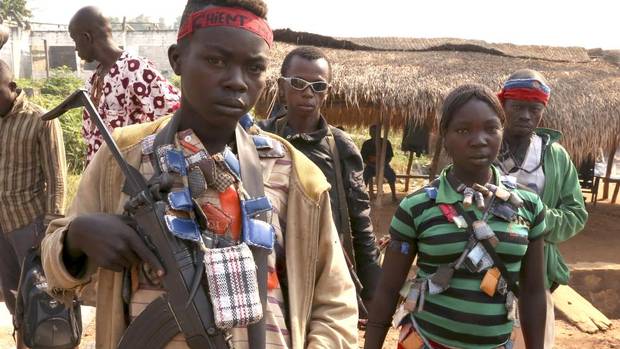
Written by: EV
A new report has been released by the United Nations Children’s Fund (UNICEF) detailing the horror children around the world have endured throughout 2014.
“This has been a devastating year for millions of children. Children have been killed while studying in the classroom and while sleeping in their beds; they have been orphaned, kidnapped, tortured, recruited, raped, and even sold as slaves. Never in recent memory have so many children been subjected to such unspeakable brutality.” – Anthony Lake, UNICEF Executive Director
Hana, 12, flashes the victory sign next to her sister Eva, 13, as they recover after the Syrian Army shelled their house in Idlib, north Syria. Syria’s 18-month-old civil war left thousands of children dead and many more traumatized. (AP Photo/Rodrigo Abd)
According to UNICEF:
“As many as 15 million children are caught up in violent conflicts in the Central African Republic, Iraq, South Sudan, the State of Palestine, Syria, and Ukraine—including those internally displaced or living as refugees. Globally, and estimated 230 million children currently live in countries and areas affected by armed conflicts.”
With the numerous altercations that have taken place across the globe, 2014 has been a particularly turbulent year. Because of this, many children have received meager attention, and some have even been forgotten. With little to know care being provided, children have become easy targets, and many are being kidnapped—sometimes directly from school—and recruited into militant groups.
Eight days after UNICEF’s report was initially released it had to be updated in light of a school attack operated by the Taliban in Peshawar, Pakistan. The attack claimed an additional 148 people, 132 of which were children.
In the Central African Republic:
- 3 million children affected by conflict
- Up to 10,000 children believed to have been recruited into militant groups
- 430 children killed and maimed
In Gaza:
- 538 children killed
- More than 3,370 children injured
- 54,000 children left homeless
In Syria:
- More than 7.3 million children affected by conflict
- This includes 1.7 million child-refugees
- 35 verified attacks on schools within the first nine months of the year causing 105 deaths, and 300 injuries
In Iraq:
- Estimated 2.7 million children affected by conflict
- At least 700 children believed to be maimed, killed, or executed
In South Sudan:
- Estimated 235,000 children under five suffering from severe acute malnutrition
- Almost 750,000 children displaced
- More than 320,000 children living as refugees
- More than 600 children killed, 200 maimed
- Around 12,000 children being used by armed forces and groups
Disease has taken its toll in West Africa as well. The Ebola outbreak has orphaned thousands of children, and five million have been prevented from attending school.
See complete statistic tables here:
(http://www.unicef.org/sowc2014/numbers/)
In a recent report from the Human Rights Watch, Nigerian teenagers are “forced to marry, convert, and endure physical and psychological abuse, forced labor, and rape in captivity.”
“You’ve seen targeted attacks against children in terms of schools being hit, in terms of abductions, rape, killing,” said Afshan Khan, UNICEF’s head of emergency programs. “In previous years, there was a concept around the protection of civilians, in particular children.”
UNICEF and partners are working to change the lives of children around the world through various programs, from providing education to vaccinations for polio. To learn more about UNICEF visit: www.unicef.org
“It is sadly ironic that in this, the 25th anniversary year of the Convention on the Rights of the Child when we have been able to celebrate so much progress for children globally, the rights of so many millions of other children have been so brutally violated,” said Lake. “Violence and trauma do more than harm individual children—they undermine the strength of societies. The world can and must do more to make 2015 a much better year for every child. For every child who grows up strong, safe, healthy and educated is a child who can go on to contribute to her own, her family’s, her community’s, her nation’s and, indeed, to our common future.”
_________________________________________________________________________________________________
Sources:
Blanchfield, Mike. The Canadian Press. Dec 28, 2014. (http://www.theglobeandmail.com/news/world/kidnappings-killings-made-2014-an-unsafe-year-to-be-a-child-unicef/article22222264/?service=mobile)
Nguyen, Trang. Deepcor. Dec 10, 2014. (http://www.deepcor.com/crisis/2014/12/10/2014-declared-worst-year-for-children-by-unicef)
Press release. UNICEF. Dec 6, 2014. (http://www.unicef.org/media/media_78058.html)





